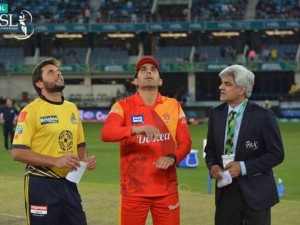 “Nicely done. That’s much better. Keep the head still” a voice rings out from the farthest outdoor net at the International Cricket Council’s global academy in Dubai. The idyllic yet state-of-the-art facility is bereft of the usual hubbub. It’s a day off, just before the Pakistan Super League (PSL) enters its final stretch with the playoffs. A small contingent of the Peshawar Zalmi has turned up for an optional net session. The big names Shahid Afridi et all are missing but that’s no reason for a less productive training session.
“Nicely done. That’s much better. Keep the head still” a voice rings out from the farthest outdoor net at the International Cricket Council’s global academy in Dubai. The idyllic yet state-of-the-art facility is bereft of the usual hubbub. It’s a day off, just before the Pakistan Super League (PSL) enters its final stretch with the playoffs. A small contingent of the Peshawar Zalmi has turned up for an optional net session. The big names Shahid Afridi et all are missing but that’s no reason for a less productive training session.
The coach, armed with a baseball mitt in his left hand, walks up to the Zalmi batsman and offers him a suggestion with his stance. The batsman sees reason in the counsel and quickly sets about getting used to it. ‘Knock. Knock. Knock.’ There is discomfort to begin with but soon there is audible validation to the way he is striking the ball. A couple of balls whizz past the coach, earning the young batsman instant appreciation. It is a very pleasing five-minute stretch in the session.
It is a new setting for Andy Flower, the man with the mitt. As coach, he is a three-time Ashes winner and has a World T20 title to boot. But this is his first association with a franchise in a T20 league. ECB’s technical director of elite coaching was here in the UAE with the England Lions, when he received a call from Mohammad Akram, the head coach of Zalmi, asking him to join his PSL side. The opportunity came about at just the right time for Flower, who would have had an otherwise ‘quiet February’ back at the Loughborough academy. He agrees to do a quick interview over lunch after the session. He has to head back to the team hotel and prepare his talk ahead of tomorrow’s crucial game.
“I think it’s worked out perfectly,” he says as we settle down with our plates, explaining his sudden shift to coaching in Twenty20 leagues. “So my job with the ECB at the moment is to work with the academy side of England cricket. I spoke to Andrew Strauss (England’s Director of Cricket) about it. One of Strauss’s ideas for English coaches is to gain more experience outside of England. Now, even though I’m Zimbabwean, I’m sure, by now, I’m one of the ‘England coaches’ as well. And… here I am.”
With the inaugural edition of the PSL squeezed into an already packed calendar, Flower has had to hit the ground running in his first T20 league assignment. His responsibilities as batting consultant of the Peshawar Zalmi, for starters, have been vastly different to how he’d usually work with England’s national side or even with the Lions. This optional practice session was only his third net session with the team since he joined them two days before the start of the tournament. “It’s very different because you are working with players on a very short-term basis,” he says.
“I know the IPL is at least double the length of this. So there’s a little more time. We have overseas players coming into a domestic squad if you like… So getting them, the captain and the other coaches to bond is a big part of our jobs here. A lot of these players would have never worked with Akram or me as a coach before. There is this imperative to get the team together and operate in a healthy fashion as quickly as possible which is maybe a bit different to what I’m used to.”
But how much of coaching is actually possible when teams end up playing games with such short turnaround times between them? “Oh, there’s very limited technical coaching here,” Flower quips. “That’s because you’re hardly training with these guys. We’ve played three games in a row and then four games in a row, leaving very little time for adjustments. So basically, I’m trying to ensure people are as confident as they can be, have as much belief in their abilities and in their teammates. In some respects, you’re actually trying to get players to relax yet still be alert enough to perform at a very high level.
“The language barrier too can be a problem. Thankfully, all of these guys speak a bit of English. They’ve been very welcoming towards us westerners in team meetings, where we speak English. Then again, if I don’t think I’m getting a point across, I call Akram over, or our managers, who can help with the message. At the same time, it is very interesting for me to be in another culture as well. That’s something I was looking forward to and something that I’ve paid attention to. It is very important for coaches to step out of their comfort zones.”
The timing of Flower’s foray into the T20 coaching sphere also conforms to the changing landscape in cricket and vindicates a growing trend of cricket’s elite coaches, who are unwilling to commit to long stints with national teams in the wake of lucrative short-term options with franchise-based T20 leagues. This trend in this age of T20 cricket is believed to be another deterrent to Test cricket’s regress even as the T20 takes rapid strides of progress.
“When I was working with England as a full-time coach, we were away for 250 days a year. And that plays havoc with your personal life,” Flower recollects. “These franchise tournaments are as much an opportunity for coaches as they are for players. You might now even see something more akin to a football management-type situation where people bring in their own support staff as well. So this brings great opportunity for coaches as well.
“Yes national teams and Test cricket remain ultimate. But that is changing very quickly. I cannot predict the future but we do need people with the right foresight to be looking at this balance between franchise and international cricket. The earning power is going to attract a lot of players and coaches. The best example would be the news of AB de Villiers possibly retiring from certain sections of international cricket. You can understand why… He also wants a life outside of hotels, training and playing grounds and there is no place in the calendar year. I don’t have a solution here but people with better foresight than I will have to at least start talking about it soon.
“I think everything evolves but we want cricket to evolve in a healthy and sustainable way. That’s where the challenge is. How are we going to sustain and keep individual boards happy while also ensuring Test cricket can still be healthy around the world? Personally… I think there is still place for all three forms of the game,” he opines.Flower is methodical and serious about his cricket but finds an immediate connect with the flamboyance of the modern batsman. The Zimbabwean was a master of the reverse-sweep long before cricket embraced the unorthodoxy in its batsmen. Yet it is something he would not profess to his wards at Zalmi. Batsmen of the sub-continent, particularly in India and Pakistan, have yet to come to terms with the audacity of de Villiers and the Maxwells of the batting world and Flower is happy to let them be.
“One of the beautiful things about the game is there are lots of different ways of winning, of having success as a bowler or batsman. This provides opportunities for people of different characters, different styles and different levels of physical attributes to be stars. You’ll have power hitters that don’t need to be innovative, you’ll have touch players that can be very successful in this form of the game. There is space for everyone and its that individual and the people that he trusts will work out how he can be successful.”
The improvisations can come later. Flower is happy coaching the Pakistani youngsters to hit the ball with a straight bat even if that puts him at a risk of getting hit. Isn’t he scared offering throw downs from so close? “That’s why I always have a mitt,” he laughs as we pick up dessert. The rest of the team have already boarded the bus. “It is a little scary. When some of these guys are picking up their big bats to hit the ball and you are closer than 22 yards, you can easily get hit. I know of coaches getting hit and it’s a very real possibility. We’ve had umpires wearing helmets, you could soon see coaches wearing helmets for throw downs,” he says.
As we’re just about to wrap up our lunch, Flower reveals a new side to his usually focused demeanour, when quizzed about his memorable moments with his first assignment with a T20 side. “Obviously we’re in the semifinals which is very good, he says. “But, there is also a chance to build some meaning to your franchise beyond just trying to win the tournament. One of the principles in which the franchise operates is that we are trying to build a culture. We have worked very closely with the Shahid Afridi foundation. We also flew in members of the Army Public School from Peshawar that was ravaged in the attacks. That connection, the spirit behind it has been really nice to be associated with.”Akram also has not limited his exposure to only these professional cricketers. He’s been out in the district in Peshawar, spreading the word about the franchise. Looking at talent. Taking some of their heroes out into the smaller villages and spreading the game to those areas. I like the fact that our goals are not only around winning the tournament. It gives a little more meaning to us and that’s been fantastic,” he signs off.
- Latest
- Trending




